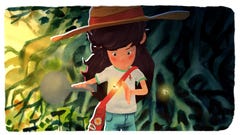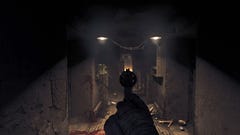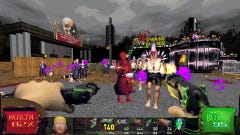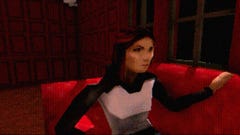Humanity review: perfect puzzles pumped with existential hot air
Doggo is Goddo
I bark and the humans obey, jumping, turning, floating into the great unknown. I am leading them toward something good, the orbs tell me. Something that grows stronger with every trial this endless parade of humanity completes.
Humanity is a VR-optional flowy puzzle platformer in which you, an ethereal shiba inu made of pure light, lead mindless hoards of “the people” into the light because a glowing orb told you to make it happen. Oh, and don’t worry if most of them end up marching off a ledge into the endless void below–those physical bodies are mere constructs and their minds will return to follow you again.
A̷̰͙̙͚͓̱̗n̮̲̣d̹͖͚̠ ̜̹a͏͇̱͙͈g͔̘͍̟a͍i̲͖̥̺͓n͘.̮̮͕̼̰ Ą͠͡nḑ̷҉ ̀͘à̧̛g̢͢ai̸͏n̡̛.̨͜͜
During each stage, you are presented with a minimalist urban landscape that must be conquered in order to demonstrate that you (or humanity?) are worthy of… whatever it is the orb wants from you. The people flow in from light-filled doorways and must be led out through glowing platforms. En route to their final destination, they also need to collect a certain number of Goldys–large living Oscar awards, essentially–in order to unlock the next set of story stages and certain game features, like pausing the game and putting little hats on the people.
Abilities are given and taken away. Sometimes you have a limited number of commands you can issue during a given stage and other times you need to activate buttons or push blocks into place in order to clear an area. Most stages require you to manage a continuous flow of people, but others task you with laying out your commands all at once before the people are set in motion.
.jpg?width=690&quality=80&format=jpg&auto=webp)
.jpg?width=690&quality=80&format=jpg&auto=webp)
.jpg?width=690&quality=80&format=jpg&auto=webp)
It’s all fairly straightforward, but Humanity remixes these mechanics just enough that every stage feels like a fresh new challenge that the previous stages have prepared you just enough to take on. The required stages all feel carefully balanced to create a lovely tip-of-the-tongue feeling, leading to the sense that the answer is right in front of you if you just look close enough. Many of the optional stages, on the other hand, are quite difficult. You have a lot of flexibility in how you go about collecting the prerequisite number of Goldys needed to unlock the next set of trials, however, so even if you can’t wrap your head around a particular puzzle, it’s easy enough to skip ahead to something else. You, like the people, just keep moving forward.
It has to be said though, the vibe is off. Off in a way that makes me wonder what exactly my shiba-self is participating in here. It’s possible I really am leading humanity to their spiritual salvation, but, then again, maybe I’m just aiding and abetting some kind of Nope-esque alien abduction of human souls destined for consumption.
"The required stages all feel carefully balanced to create a lovely tip-of-the-tongue feeling, leading to the sense that the answer is right in front of you if you just look close enough"
Every aspect of Humanity contributes to an air of optimistic unease, from the contemplative music fit for a funeral to the slowly dimming colour palette and, how could you ever forget, the endless stream of bright-eyed people moseying off the edge of every stage like lemmings. The impact of this is definitely softened by Humanity’s simplistic art style, but that doesn’t quite stop the swarms of people from tickling the part of my brain that cringes away when I see a hoard of ants swarming a Dorito on the sidewalk. I don’t have any VR devices and thank god for that because I’m sure that sensation doesn’t improve when the people are swarming in three dimensions. Still, if you do have a headset, are really into crowds, and don’t mind the gut-wrenching feeling of having nothing but air under your feet, I would definitely give Humanity a go.
.jpg?width=690&quality=80&format=jpg&auto=webp)
Each set of stages thus far has focused on a different aspect of, well, humanity, bearing titles like “awakening,” “choice” and “fate.” Sometimes these are reflected in the trials themselves, but mostly they provide vague conversational fodder for the orbs to chatter about without ever actually saying anything. In some ways, this reminds me of the Talos Principle (which I never finished because I am a good little sheep who would never climb a forbidden tower) but the story is stretched much thinner here. It’s more of an existentialist aesthetic than a story, really. There are “mysteries” not necessarily because there’s anything especially mysterious going on, but because the orbs refuse to answer the shiba inu’s simple questions in a reasonable manner. Which is totally fine I guess, just kind of annoying.
It does make me wonder, though, if this existentialist aesthetic was chosen for any particular reason or just because story mode necessitates the presence of a story and if you make the story’s theme “stuff sure is confusing” nothing really needs to make sense. As I said earlier, humanity’s puzzle mechanics are extremely strong, with each stage requiring a satisfying blend of intuition and experience to successfully complete. Its stage creation and sharing functions are similarly friendly and effective. The people could just as easily be water flowing through a zen garden or fish swimming through the sea, though, so why aren’t they? The fact that they are people and I am a shiba inu must mean something, right? Right?!
I don’t know, but I will find out. Like my Shiba-self, I charge ahead, uncertain if the creators have something meaningful to say or are just yanking my leash.
This review is based on a review build of the game provided by the publisher Enhance.
.jpg?width=880&quality=80&format=jpg&auto=webp)




.jpg?width=240&height=135&fit=crop&quality=80&format=jpg&auto=webp)





